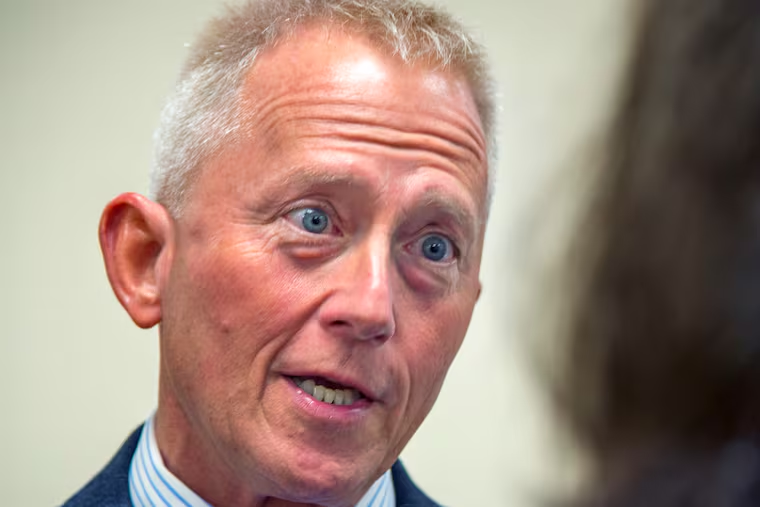‘We’ve got serious issues’: Inside Jeff Van Drew’s impeachment-fueled defection to the GOP
A dizzying week in which New Jersey Democratic Rep. Jeff Van Drew prepared to defect to the Republican Party was the inevitable result of a clumsy approach to the politics of impeachment.

Jeff Van Drew got some bad news last Wednesday.
The results of an internal poll of the New Jersey congressman’s district were finally in after he had spent months as the most vocal Democratic critic of his party’s push to impeach President Donald Trump. And things weren’t looking good.
“We’ve got serious issues to talk about,” one of Van Drew’s strategists told him.
Forty-eight hours later, Van Drew was in the White House with his chief of staff. He agreed to defect to the GOP. By Saturday, news of his plan had gone public. By Sunday, almost his entire Washington staff had quit in protest. And after days of silence, he finally spoke Tuesday, still without addressing what he plans to do.
“I’m not discussing any of that now. There will be a time,” he said as he rode an elevator to an afternoon House vote. “I’m reevaluating my life and my thoughts.”
Such a dizzying week was the inevitable result of a clumsy approach to the politics of impeachment, according to interviews with multiple people who had direct knowledge of Van Drew’s thinking in the weeks leading up to his party switch and spoke on condition of anonymity to share private conversations.
“This is a breakup,” said Ben Dworkin, director of public policy at Rowan University. “It’s almost never done where everyone can walk away smiling.”
Van Drew was one of only two House Democrats to vote against the impeachment inquiry into Trump’s dealings in Ukraine, a stance he touted in Fox News appearances that drew the attention and praise of Trump himself. That eroded support among Democrats in his South Jersey district and with key party leaders in the state, including Gov. Phil Murphy and State Senate President Stephen Sweeney.
“He’s got a lot to explain to his constituents,” Murphy told the New Jersey Globe last week, the same day Van Drew got the poll results.
Since the summer, aides had been urging Van Drew to commission the poll to gauge how a vote against impeachment would play, multiple people familiar with the matter said. But Van Drew resisted doing so.
It took three Democrats who billed themselves as the “Van Drew Team” losing elections in his old state legislative district last month to persuade him to finally run the poll. Van Drew’s vote against the impeachment inquiry consumed the final days of the off-year campaign in the district he had long represented as a state lawmaker.
“A majority of my members were very upset with your 'no’ vote on the impeachment inquiry,” Atlantic County Democratic Chairman Michael Suleiman wrote in a letter to Van Drew this month, imploring him to change his mind. “Candidly, it was a big distraction for my candidates and municipal leaders in Atlantic County during the tail end of the [2019] general election cycle.”
When the poll came back, the results were grim: 58% of likely Democratic voters wanted someone other than Van Drew to be the Democratic nominee, 43% disapproved of his performance, and only 22% had a favorable view of him.
Within hours, Van Drew started asking people if he could even win the Democratic primary. Aides said it was possible but would be costly. He would likely have to spend almost $1 million just for a primary campaign and aggressively court support from New Jersey Democratic insiders whose endorsement he would need at county political conventions to get favorable ballot positions.
At the time, Van Drew had more than $900,000 in campaign cash, according to filings. But such an expensive primary would have depleted that war chest. And that would have forced him to raise a good deal more money to potentially take on David Richter, a millionaire Republican who was seen as the likely GOP front-runner and can self-fund his campaign.
“Jeff really hates fund-raising,” said one strategist who spoke directly to Van Drew about his reelection campaign.
Van Drew denied Tuesday that he made his decision out of political expediency.
“Any decision that I will make will be based upon ultimately reconciling the philosophy that I feel in my heart,” he said.
Seeing his path to renomination as a Democrat largely blocked marked the start of a multi-day blackout period, during which Van Drew stopped answering calls from key advisers, according to multiple allies who tried unsuccessfully to reach him.
But after the White House meeting, Allison Murphy, Van Drew’s chief of staff, began making a series of calls to inform key staffers of what was happening. And before long, the news was out.
Van Drew’s victory in a Republican primary is hardly assured. He’s contending with multiple Republicans who were already running, as well as local party leaders and activists skeptical of his voting record and his longstanding ties to the state’s Democratic machine. Trump has fired off a couple of tweets lauding Van Drew. But the president has yet to formally endorse him, and it remains to be seen how hard he would campaign for the longtime Democrat in a Republican primary.
With the House set Wednesday to make Trump only the third president impeached in U.S. history, Van Drew said Tuesday he hadn’t changed his mind on impeachment: “I think it’s actually a clumsy tool that is meant for very, very serious issues.”
Staff writer Jonathan Tamari contributed to this article.